Taxation Law: Analysis of Residency Status and Tax Implications
VerifiedAdded on 2023/03/23
|9
|1376
|46
Report
AI Summary
This report, prepared by Roma Tax Consultancy, offers a detailed analysis of taxation law with a specific focus on determining residency status under Australian law for a client, Jack Johnson, who moved to Bahrain. The report examines the relevant tests for residency, including the resides test, permanent place of abode test, 183-day test, and Commonwealth superannuation test, as defined in the Income Tax Assessment Act 1997 (ITAA 1997). The report provides a letter of advice based on the client's circumstances, concluding that the client is not an Australian resident for tax purposes. The report also includes a brief overview of a partnership's net income and a distribution statement, along with a list of cited references. The analysis is thorough, referencing key legal principles and case law to support its conclusions, offering practical advice to the client regarding their tax obligations. The report is structured to provide clear guidance, offering a comprehensive overview of the relevant legal and practical considerations for determining residency status.
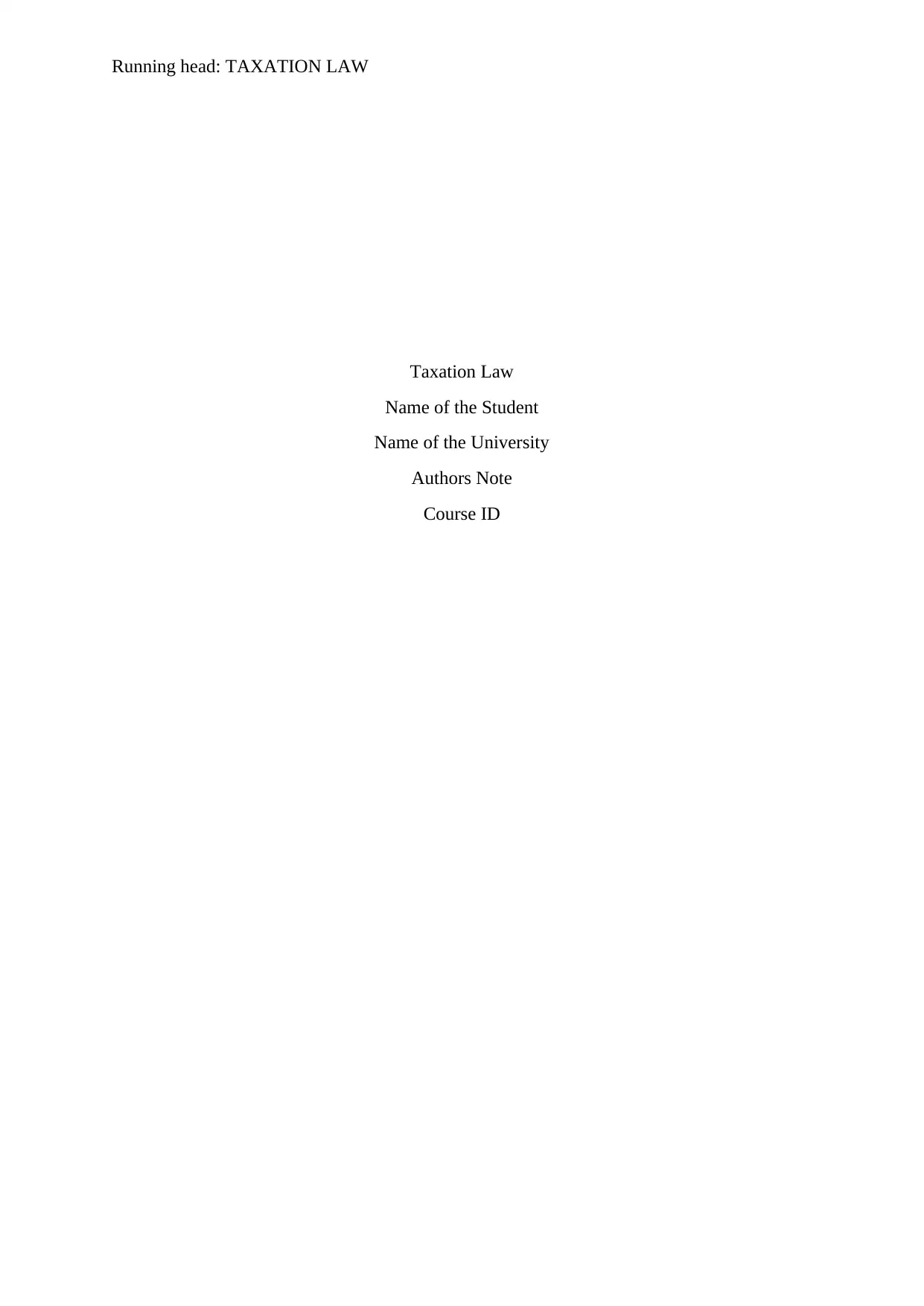
Running head: TAXATION LAW
Taxation Law
Name of the Student
Name of the University
Authors Note
Course ID
Taxation Law
Name of the Student
Name of the University
Authors Note
Course ID
Paraphrase This Document
Need a fresh take? Get an instant paraphrase of this document with our AI Paraphraser
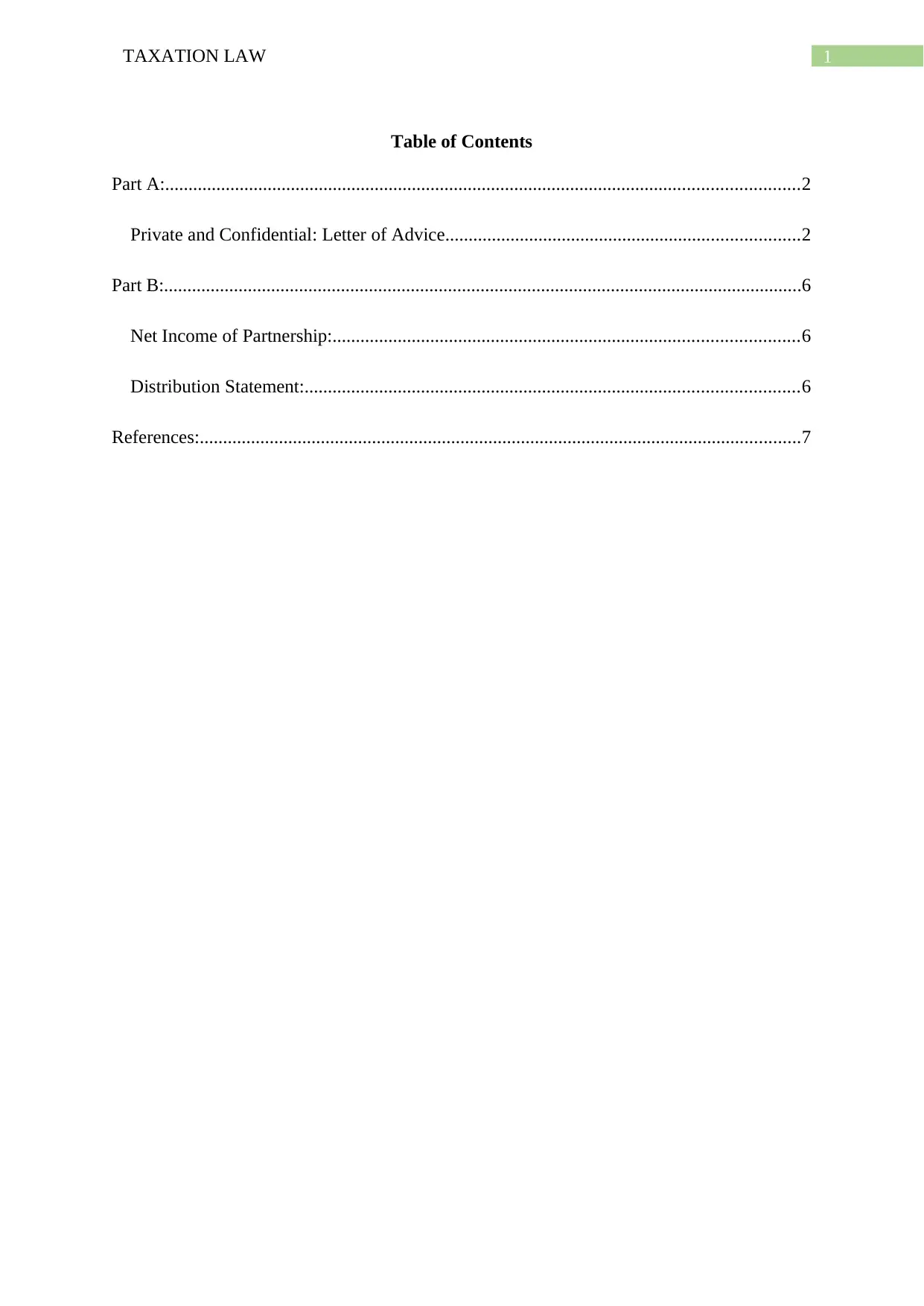
1TAXATION LAW
Table of Contents
Part A:........................................................................................................................................2
Private and Confidential: Letter of Advice............................................................................2
Part B:.........................................................................................................................................6
Net Income of Partnership:....................................................................................................6
Distribution Statement:..........................................................................................................6
References:.................................................................................................................................7
Table of Contents
Part A:........................................................................................................................................2
Private and Confidential: Letter of Advice............................................................................2
Part B:.........................................................................................................................................6
Net Income of Partnership:....................................................................................................6
Distribution Statement:..........................................................................................................6
References:.................................................................................................................................7
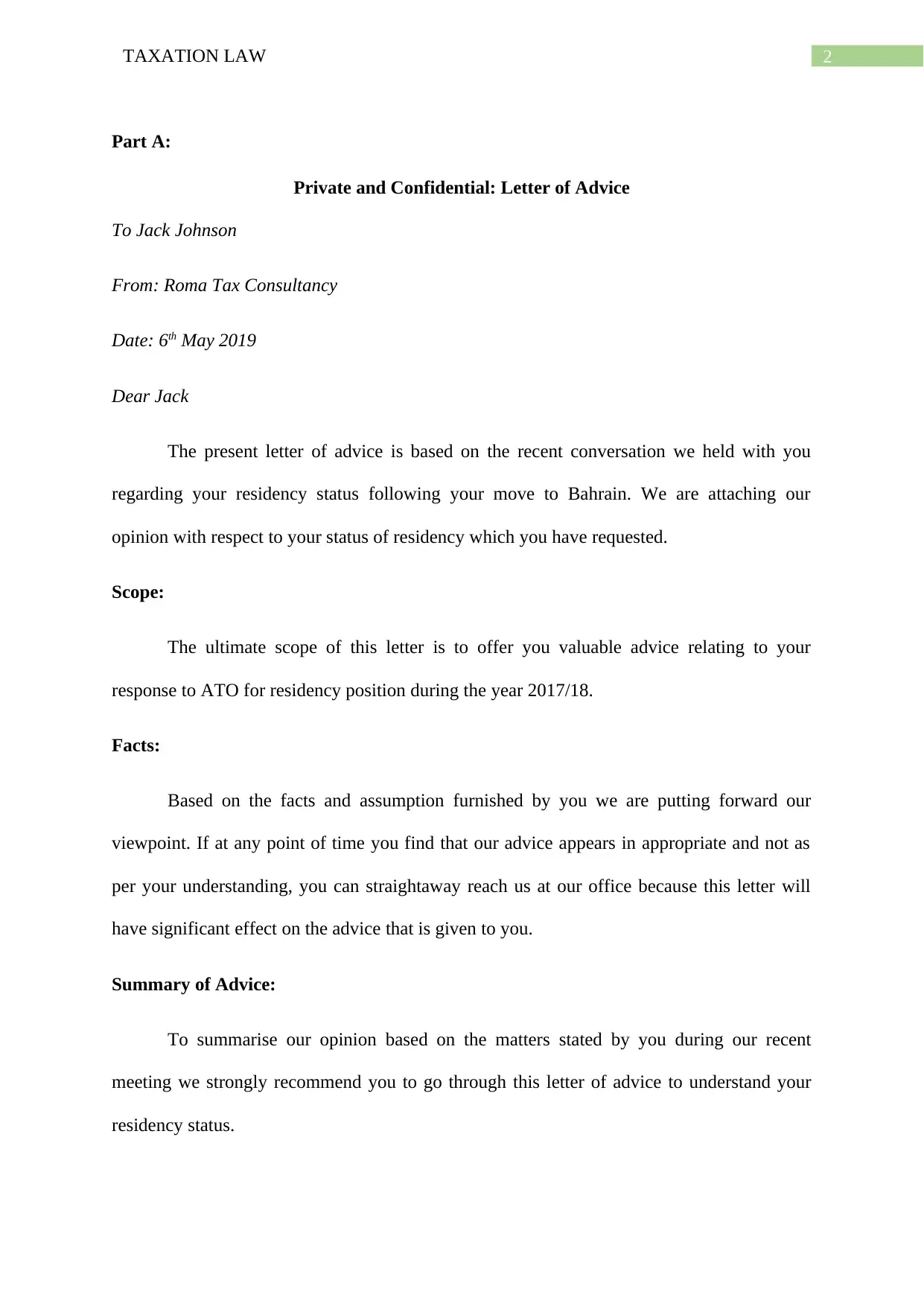
2TAXATION LAW
Part A:
Private and Confidential: Letter of Advice
To Jack Johnson
From: Roma Tax Consultancy
Date: 6th May 2019
Dear Jack
The present letter of advice is based on the recent conversation we held with you
regarding your residency status following your move to Bahrain. We are attaching our
opinion with respect to your status of residency which you have requested.
Scope:
The ultimate scope of this letter is to offer you valuable advice relating to your
response to ATO for residency position during the year 2017/18.
Facts:
Based on the facts and assumption furnished by you we are putting forward our
viewpoint. If at any point of time you find that our advice appears in appropriate and not as
per your understanding, you can straightaway reach us at our office because this letter will
have significant effect on the advice that is given to you.
Summary of Advice:
To summarise our opinion based on the matters stated by you during our recent
meeting we strongly recommend you to go through this letter of advice to understand your
residency status.
Part A:
Private and Confidential: Letter of Advice
To Jack Johnson
From: Roma Tax Consultancy
Date: 6th May 2019
Dear Jack
The present letter of advice is based on the recent conversation we held with you
regarding your residency status following your move to Bahrain. We are attaching our
opinion with respect to your status of residency which you have requested.
Scope:
The ultimate scope of this letter is to offer you valuable advice relating to your
response to ATO for residency position during the year 2017/18.
Facts:
Based on the facts and assumption furnished by you we are putting forward our
viewpoint. If at any point of time you find that our advice appears in appropriate and not as
per your understanding, you can straightaway reach us at our office because this letter will
have significant effect on the advice that is given to you.
Summary of Advice:
To summarise our opinion based on the matters stated by you during our recent
meeting we strongly recommend you to go through this letter of advice to understand your
residency status.
⊘ This is a preview!⊘
Do you want full access?
Subscribe today to unlock all pages.

Trusted by 1+ million students worldwide
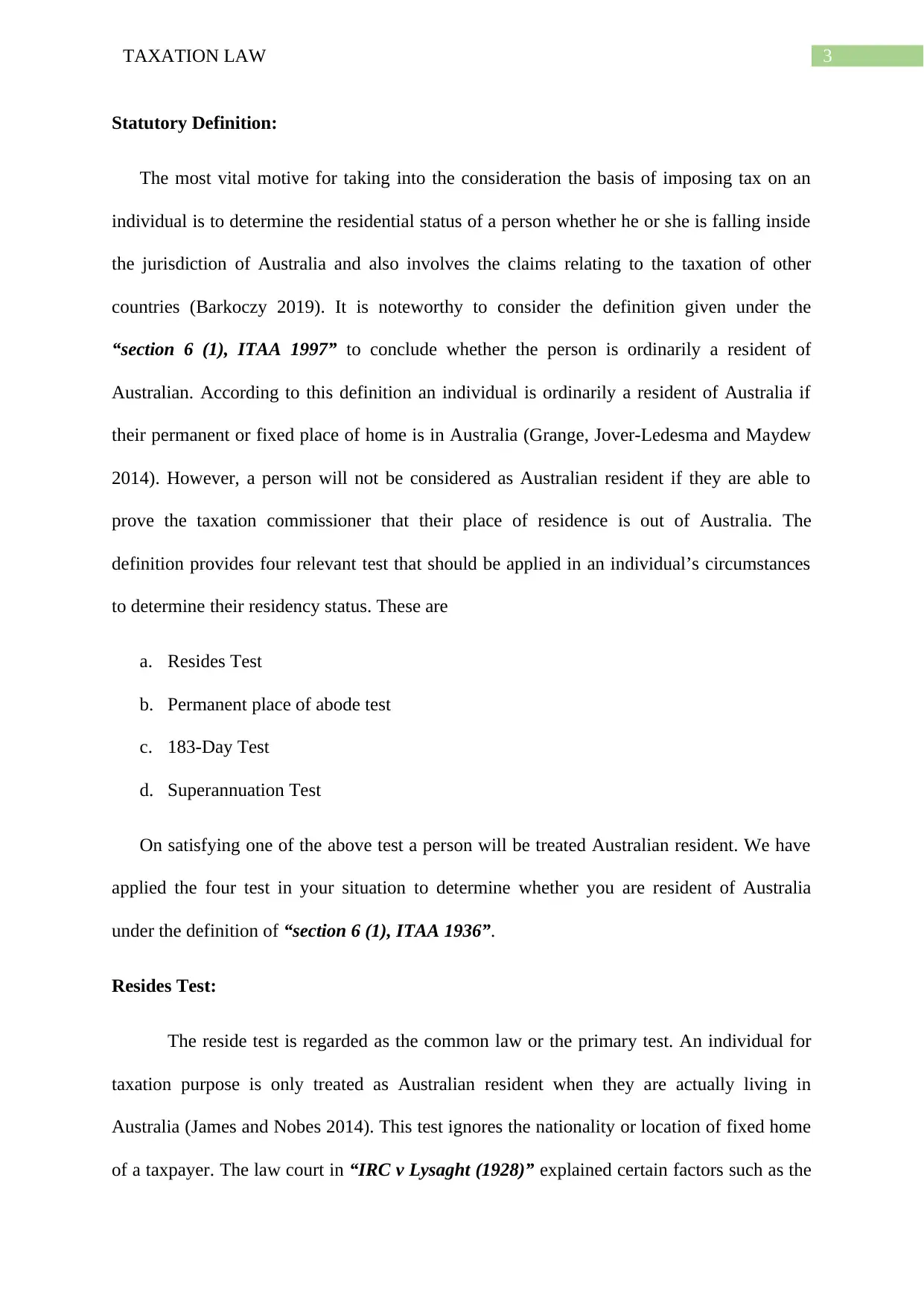
3TAXATION LAW
Statutory Definition:
The most vital motive for taking into the consideration the basis of imposing tax on an
individual is to determine the residential status of a person whether he or she is falling inside
the jurisdiction of Australia and also involves the claims relating to the taxation of other
countries (Barkoczy 2019). It is noteworthy to consider the definition given under the
“section 6 (1), ITAA 1997” to conclude whether the person is ordinarily a resident of
Australian. According to this definition an individual is ordinarily a resident of Australia if
their permanent or fixed place of home is in Australia (Grange, Jover-Ledesma and Maydew
2014). However, a person will not be considered as Australian resident if they are able to
prove the taxation commissioner that their place of residence is out of Australia. The
definition provides four relevant test that should be applied in an individual’s circumstances
to determine their residency status. These are
a. Resides Test
b. Permanent place of abode test
c. 183-Day Test
d. Superannuation Test
On satisfying one of the above test a person will be treated Australian resident. We have
applied the four test in your situation to determine whether you are resident of Australia
under the definition of “section 6 (1), ITAA 1936”.
Resides Test:
The reside test is regarded as the common law or the primary test. An individual for
taxation purpose is only treated as Australian resident when they are actually living in
Australia (James and Nobes 2014). This test ignores the nationality or location of fixed home
of a taxpayer. The law court in “IRC v Lysaght (1928)” explained certain factors such as the
Statutory Definition:
The most vital motive for taking into the consideration the basis of imposing tax on an
individual is to determine the residential status of a person whether he or she is falling inside
the jurisdiction of Australia and also involves the claims relating to the taxation of other
countries (Barkoczy 2019). It is noteworthy to consider the definition given under the
“section 6 (1), ITAA 1997” to conclude whether the person is ordinarily a resident of
Australian. According to this definition an individual is ordinarily a resident of Australia if
their permanent or fixed place of home is in Australia (Grange, Jover-Ledesma and Maydew
2014). However, a person will not be considered as Australian resident if they are able to
prove the taxation commissioner that their place of residence is out of Australia. The
definition provides four relevant test that should be applied in an individual’s circumstances
to determine their residency status. These are
a. Resides Test
b. Permanent place of abode test
c. 183-Day Test
d. Superannuation Test
On satisfying one of the above test a person will be treated Australian resident. We have
applied the four test in your situation to determine whether you are resident of Australia
under the definition of “section 6 (1), ITAA 1936”.
Resides Test:
The reside test is regarded as the common law or the primary test. An individual for
taxation purpose is only treated as Australian resident when they are actually living in
Australia (James and Nobes 2014). This test ignores the nationality or location of fixed home
of a taxpayer. The law court in “IRC v Lysaght (1928)” explained certain factors such as the
Paraphrase This Document
Need a fresh take? Get an instant paraphrase of this document with our AI Paraphraser
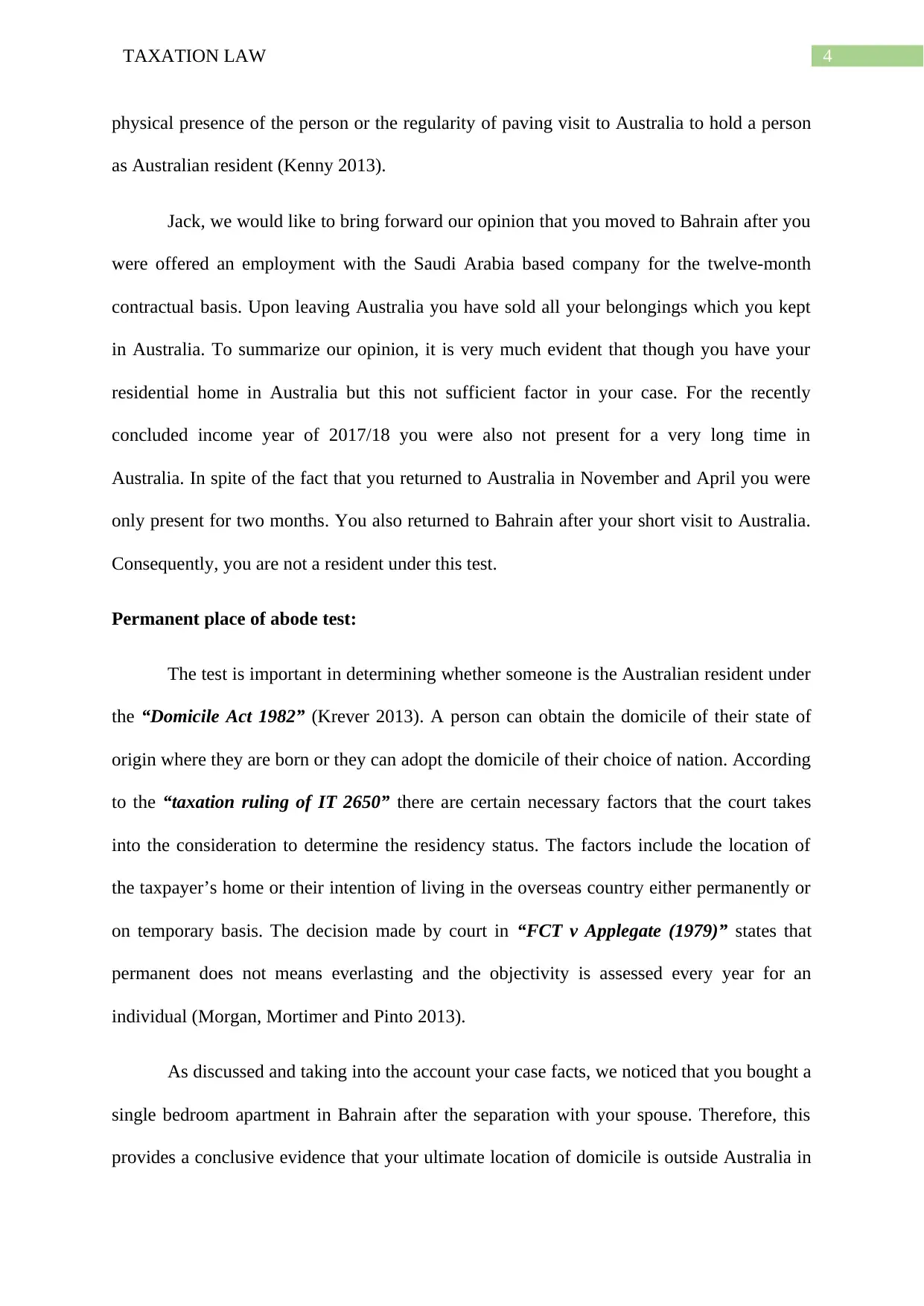
4TAXATION LAW
physical presence of the person or the regularity of paving visit to Australia to hold a person
as Australian resident (Kenny 2013).
Jack, we would like to bring forward our opinion that you moved to Bahrain after you
were offered an employment with the Saudi Arabia based company for the twelve-month
contractual basis. Upon leaving Australia you have sold all your belongings which you kept
in Australia. To summarize our opinion, it is very much evident that though you have your
residential home in Australia but this not sufficient factor in your case. For the recently
concluded income year of 2017/18 you were also not present for a very long time in
Australia. In spite of the fact that you returned to Australia in November and April you were
only present for two months. You also returned to Bahrain after your short visit to Australia.
Consequently, you are not a resident under this test.
Permanent place of abode test:
The test is important in determining whether someone is the Australian resident under
the “Domicile Act 1982” (Krever 2013). A person can obtain the domicile of their state of
origin where they are born or they can adopt the domicile of their choice of nation. According
to the “taxation ruling of IT 2650” there are certain necessary factors that the court takes
into the consideration to determine the residency status. The factors include the location of
the taxpayer’s home or their intention of living in the overseas country either permanently or
on temporary basis. The decision made by court in “FCT v Applegate (1979)” states that
permanent does not means everlasting and the objectivity is assessed every year for an
individual (Morgan, Mortimer and Pinto 2013).
As discussed and taking into the account your case facts, we noticed that you bought a
single bedroom apartment in Bahrain after the separation with your spouse. Therefore, this
provides a conclusive evidence that your ultimate location of domicile is outside Australia in
physical presence of the person or the regularity of paving visit to Australia to hold a person
as Australian resident (Kenny 2013).
Jack, we would like to bring forward our opinion that you moved to Bahrain after you
were offered an employment with the Saudi Arabia based company for the twelve-month
contractual basis. Upon leaving Australia you have sold all your belongings which you kept
in Australia. To summarize our opinion, it is very much evident that though you have your
residential home in Australia but this not sufficient factor in your case. For the recently
concluded income year of 2017/18 you were also not present for a very long time in
Australia. In spite of the fact that you returned to Australia in November and April you were
only present for two months. You also returned to Bahrain after your short visit to Australia.
Consequently, you are not a resident under this test.
Permanent place of abode test:
The test is important in determining whether someone is the Australian resident under
the “Domicile Act 1982” (Krever 2013). A person can obtain the domicile of their state of
origin where they are born or they can adopt the domicile of their choice of nation. According
to the “taxation ruling of IT 2650” there are certain necessary factors that the court takes
into the consideration to determine the residency status. The factors include the location of
the taxpayer’s home or their intention of living in the overseas country either permanently or
on temporary basis. The decision made by court in “FCT v Applegate (1979)” states that
permanent does not means everlasting and the objectivity is assessed every year for an
individual (Morgan, Mortimer and Pinto 2013).
As discussed and taking into the account your case facts, we noticed that you bought a
single bedroom apartment in Bahrain after the separation with your spouse. Therefore, this
provides a conclusive evidence that your ultimate location of domicile is outside Australia in
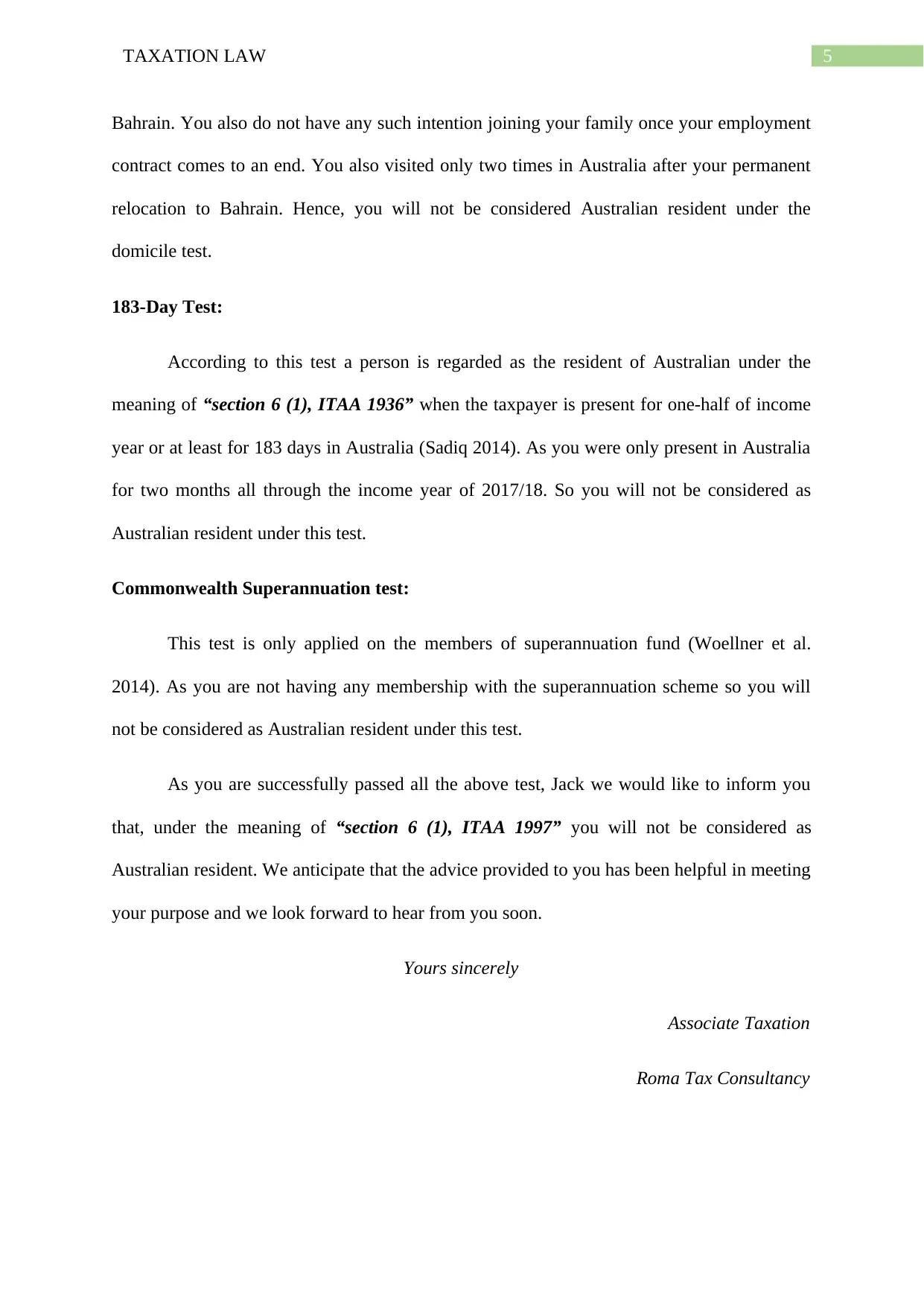
5TAXATION LAW
Bahrain. You also do not have any such intention joining your family once your employment
contract comes to an end. You also visited only two times in Australia after your permanent
relocation to Bahrain. Hence, you will not be considered Australian resident under the
domicile test.
183-Day Test:
According to this test a person is regarded as the resident of Australian under the
meaning of “section 6 (1), ITAA 1936” when the taxpayer is present for one-half of income
year or at least for 183 days in Australia (Sadiq 2014). As you were only present in Australia
for two months all through the income year of 2017/18. So you will not be considered as
Australian resident under this test.
Commonwealth Superannuation test:
This test is only applied on the members of superannuation fund (Woellner et al.
2014). As you are not having any membership with the superannuation scheme so you will
not be considered as Australian resident under this test.
As you are successfully passed all the above test, Jack we would like to inform you
that, under the meaning of “section 6 (1), ITAA 1997” you will not be considered as
Australian resident. We anticipate that the advice provided to you has been helpful in meeting
your purpose and we look forward to hear from you soon.
Yours sincerely
Associate Taxation
Roma Tax Consultancy
Bahrain. You also do not have any such intention joining your family once your employment
contract comes to an end. You also visited only two times in Australia after your permanent
relocation to Bahrain. Hence, you will not be considered Australian resident under the
domicile test.
183-Day Test:
According to this test a person is regarded as the resident of Australian under the
meaning of “section 6 (1), ITAA 1936” when the taxpayer is present for one-half of income
year or at least for 183 days in Australia (Sadiq 2014). As you were only present in Australia
for two months all through the income year of 2017/18. So you will not be considered as
Australian resident under this test.
Commonwealth Superannuation test:
This test is only applied on the members of superannuation fund (Woellner et al.
2014). As you are not having any membership with the superannuation scheme so you will
not be considered as Australian resident under this test.
As you are successfully passed all the above test, Jack we would like to inform you
that, under the meaning of “section 6 (1), ITAA 1997” you will not be considered as
Australian resident. We anticipate that the advice provided to you has been helpful in meeting
your purpose and we look forward to hear from you soon.
Yours sincerely
Associate Taxation
Roma Tax Consultancy
⊘ This is a preview!⊘
Do you want full access?
Subscribe today to unlock all pages.

Trusted by 1+ million students worldwide
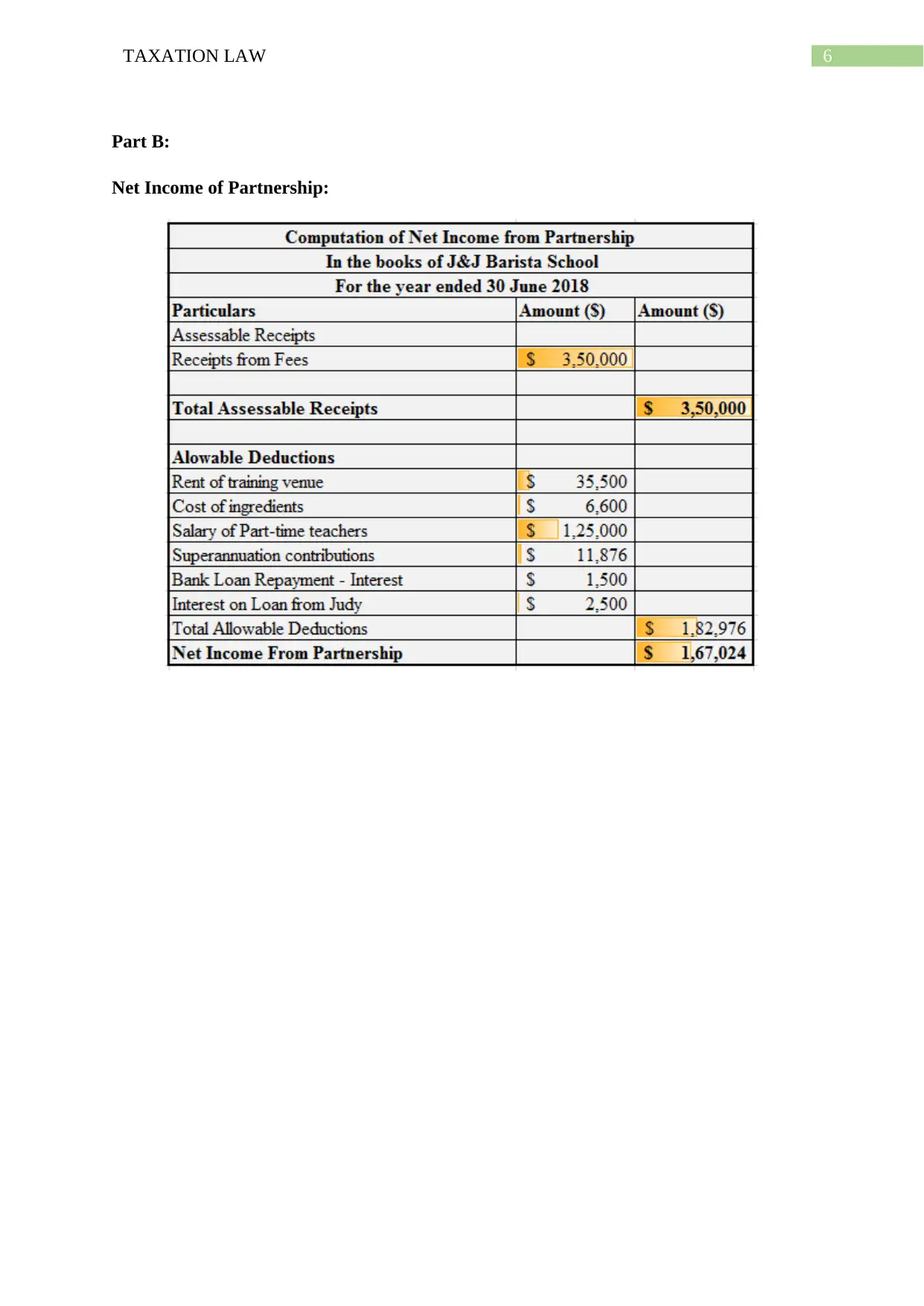
6TAXATION LAW
Part B:
Net Income of Partnership:
Part B:
Net Income of Partnership:
Paraphrase This Document
Need a fresh take? Get an instant paraphrase of this document with our AI Paraphraser
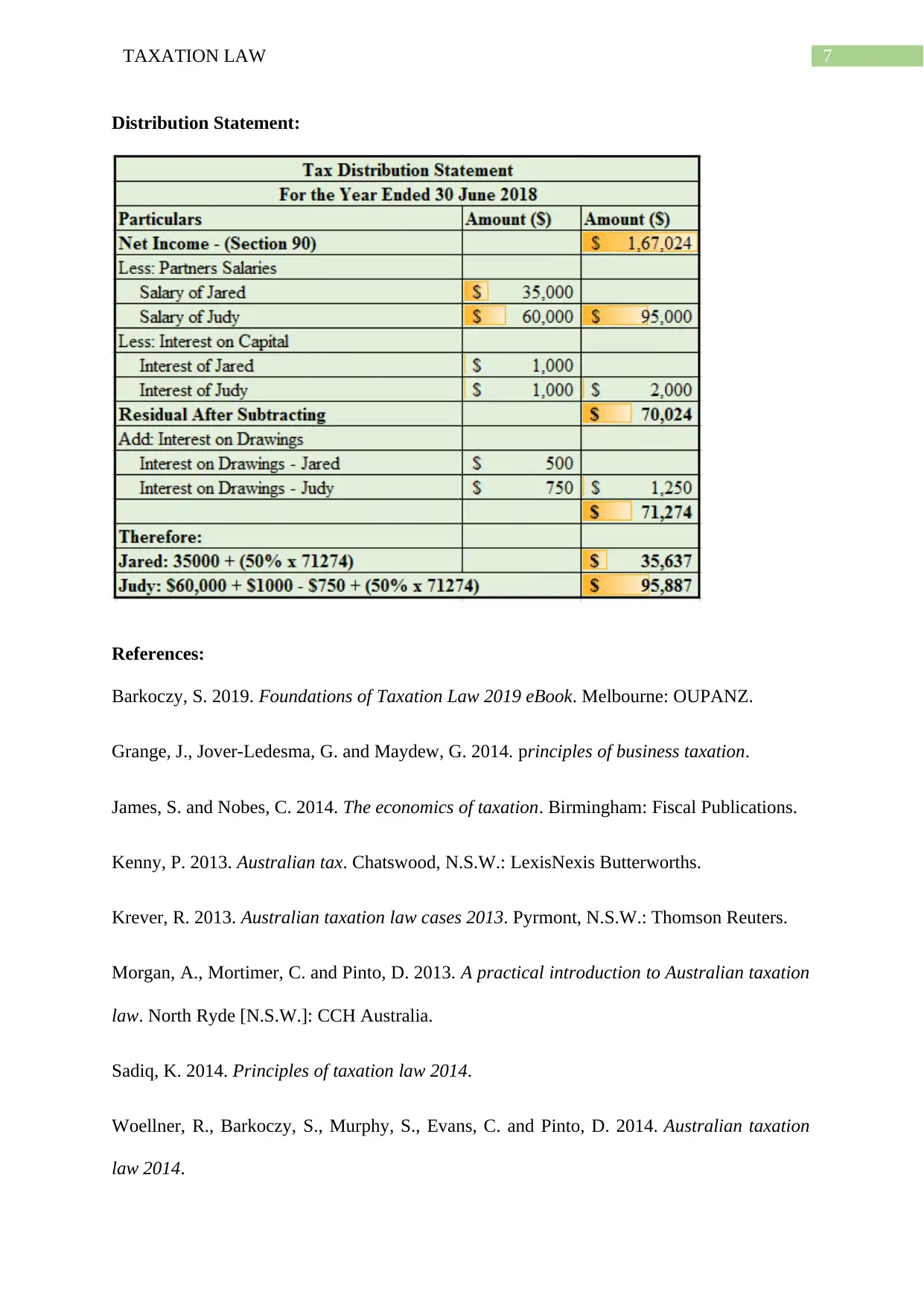
7TAXATION LAW
Distribution Statement:
References:
Barkoczy, S. 2019. Foundations of Taxation Law 2019 eBook. Melbourne: OUPANZ.
Grange, J., Jover-Ledesma, G. and Maydew, G. 2014. principles of business taxation.
James, S. and Nobes, C. 2014. The economics of taxation. Birmingham: Fiscal Publications.
Kenny, P. 2013. Australian tax. Chatswood, N.S.W.: LexisNexis Butterworths.
Krever, R. 2013. Australian taxation law cases 2013. Pyrmont, N.S.W.: Thomson Reuters.
Morgan, A., Mortimer, C. and Pinto, D. 2013. A practical introduction to Australian taxation
law. North Ryde [N.S.W.]: CCH Australia.
Sadiq, K. 2014. Principles of taxation law 2014.
Woellner, R., Barkoczy, S., Murphy, S., Evans, C. and Pinto, D. 2014. Australian taxation
law 2014.
Distribution Statement:
References:
Barkoczy, S. 2019. Foundations of Taxation Law 2019 eBook. Melbourne: OUPANZ.
Grange, J., Jover-Ledesma, G. and Maydew, G. 2014. principles of business taxation.
James, S. and Nobes, C. 2014. The economics of taxation. Birmingham: Fiscal Publications.
Kenny, P. 2013. Australian tax. Chatswood, N.S.W.: LexisNexis Butterworths.
Krever, R. 2013. Australian taxation law cases 2013. Pyrmont, N.S.W.: Thomson Reuters.
Morgan, A., Mortimer, C. and Pinto, D. 2013. A practical introduction to Australian taxation
law. North Ryde [N.S.W.]: CCH Australia.
Sadiq, K. 2014. Principles of taxation law 2014.
Woellner, R., Barkoczy, S., Murphy, S., Evans, C. and Pinto, D. 2014. Australian taxation
law 2014.

8TAXATION LAW
⊘ This is a preview!⊘
Do you want full access?
Subscribe today to unlock all pages.

Trusted by 1+ million students worldwide
1 out of 9
Related Documents
Your All-in-One AI-Powered Toolkit for Academic Success.
+13062052269
info@desklib.com
Available 24*7 on WhatsApp / Email
![[object Object]](/_next/static/media/star-bottom.7253800d.svg)
Unlock your academic potential
Copyright © 2020–2026 A2Z Services. All Rights Reserved. Developed and managed by ZUCOL.





